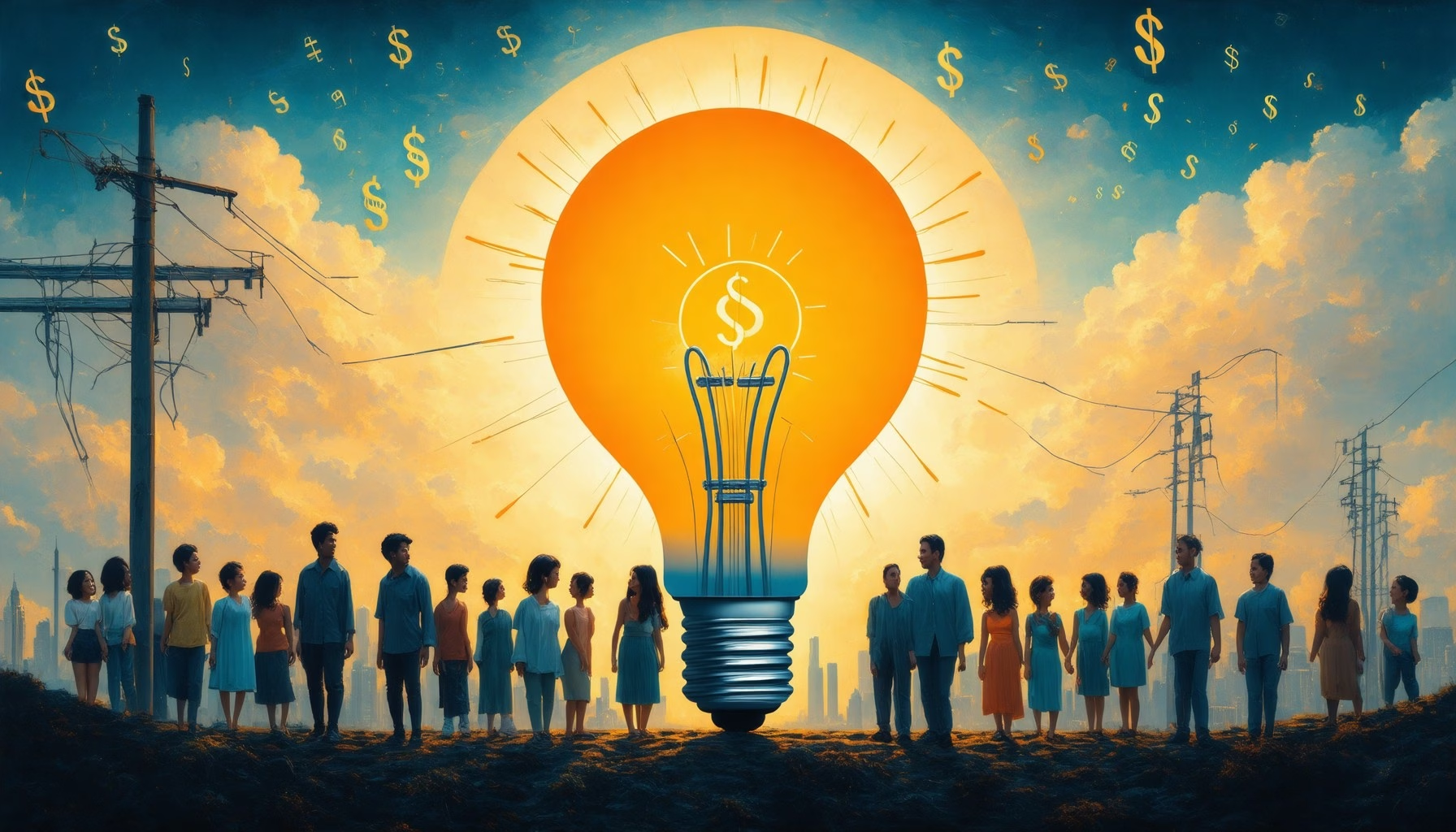Key Takeaways
- Explore various government assistance for energy bills across the U.S. to alleviate rising utility costs.
- Discover specific programs like LIHEAP that provide essential financial support for low-income households.
- Access emergency help with utility bills through local charities and state programs during times of crisis.
- Learn about state-specific assistance options in places like Virginia and California for tailored support.
- Utilize online resources to apply for energy assistance quickly and efficiently, ensuring you have necessary documents ready.
- Prioritize essential expenses and consider budgeting tools to manage financial stress effectively.
- Stay informed about government support for energy bills 2023 to take advantage of new initiatives and resources.
In today’s challenging economic landscape, many individuals and families find themselves struggling to keep up with rising energy costs. This comprehensive guide to government assistance for energy bills aims to illuminate the various support options available across the U.S. Whether you’re asking yourself, “What can I do if I’m struggling to pay my bills?” or seeking specific programs like government assistance for utility bills in Virginia or California, this article will provide valuable insights. We will explore essential topics such as free government assistance for energy bills, emergency help with utility bills, and the latest updates on government support for energy bills 2023. Additionally, we’ll cover resources for pensioners and businesses, ensuring that you have access to the financial assistance you need. Join us as we navigate the landscape of government grants for utility bills and discover how to effectively apply for energy assistance online, empowering you to manage your electricity costs with confidence.
What to do when you have no money to pay your bills?
Facing financial difficulties can be overwhelming, especially when you find yourself unable to pay your bills. Understanding the available resources and options can help you navigate this challenging situation. Here are some essential steps to consider:
Understanding Government Assistance for Energy Bills
Government assistance for energy bills is designed to help individuals and families who are struggling to meet their utility expenses. Various programs exist at both federal and state levels, providing financial assistance for electricity bills and other essential utilities. These programs aim to alleviate the burden of high energy costs, ensuring that everyone has access to basic services.
To access government support for energy bills, you can start by visiting Benefits.gov, where you can find information on eligibility and application processes for different assistance programs. Additionally, the U.S. Department of Energy offers resources to help you understand your options for financial assistance for energy bills.
What to Do When You Can’t Pay Your Bills
When you find yourself in a situation where paying bills seems impossible, consider the following steps:
- Cover Your Four Walls: Prioritize essential expenses such as housing, utilities, food, and transportation. Ensuring these basic needs are met is crucial for your immediate well-being.
- Create a Budget: Develop a detailed budget that outlines your income and expenses. Use budgeting tools or apps to track your spending and identify areas where you can cut back. The 50/30/20 rule can be a helpful guideline, allocating 50% of your income to needs, 30% to wants, and 20% to savings or debt repayment.
- Cut Unnecessary Spending: Review your discretionary expenses and eliminate non-essential items. This may include dining out, subscription services, or luxury purchases. Focus on living frugally until your financial situation improves.
- Stop Taking Out Debt: Avoid accumulating more debt by refraining from using credit cards or taking out loans. This can lead to a cycle of debt that is difficult to escape. Instead, focus on managing your current obligations.
- Watch Out for Debt Scams: Be vigilant about potential scams targeting individuals in financial distress. Research any debt relief services thoroughly and avoid companies that require upfront fees or make unrealistic promises.
- Plan Ways to Increase Your Income: Explore opportunities to boost your income, such as taking on a part-time job, freelancing, or selling unused items. Websites like Upwork or Fiverr can connect you with freelance gigs, while platforms like eBay or Facebook Marketplace can help you sell unwanted goods.
- Contact Your Lenders: Reach out to your creditors to discuss your situation. Many lenders offer hardship programs or payment plans that can provide temporary relief. Being proactive can prevent late fees and negative impacts on your credit score.
- Give Your Creditors Their Fair Share: If you are unable to pay all your bills, consider negotiating with creditors to settle for a lower amount or establish a payment plan that fits your budget. This can help you manage your debts more effectively.
For additional resources, consider visiting government websites like the Consumer Financial Protection Bureau (CFPB) for guidance on managing debt and financial planning. By taking these proactive steps, you can better navigate your financial challenges and explore available government assistance for utility bills.

Who Helps with Electric Bills in VA?
In Virginia, various organizations and programs provide essential assistance with electric bills, ensuring that families in need can access the support they require. Understanding these resources can significantly alleviate the financial burden of energy costs.
Government Assistance for Utility Bills in Virginia
Several key entities offer government assistance for utility bills in Virginia:
- Dominion Energy: As the primary utility provider in Virginia, Dominion Energy offers various assistance programs for customers facing financial hardships. Their Energy Assistance Program helps eligible customers with their electric bills, particularly during the winter months. More information can be found on their official website.
- Virginia Department of Social Services (VDSS): The VDSS administers the Low-Income Home Energy Assistance Program (LIHEAP), which provides financial assistance to low-income households to help cover heating and cooling costs. This program is crucial for families struggling to pay their energy bills.
- Local Community Action Agencies: Various local agencies across Virginia offer energy assistance programs tailored to the needs of their communities. These agencies can provide direct financial assistance, energy efficiency education, and resources to help manage energy costs.
- Nonprofit Organizations: Several nonprofit organizations, such as the Salvation Army and Catholic Charities, also provide assistance with utility bills. They often have specific programs designed to help families in crisis situations.
For more detailed information on eligibility and application processes, individuals can visit the Virginia Department of Social Services website or contact their local community action agency.
Emergency Help with Utility Bills in Virginia
In times of crisis, emergency assistance programs can provide immediate relief for those struggling to pay their electric bills. Here are some options available in Virginia:
- Emergency Energy Assistance Program: This program is designed to help households facing a heating or cooling emergency. Eligible families can receive financial assistance to cover their energy bills during extreme weather conditions.
- Local Charities and Churches: Many local charities and churches offer emergency funds to help families in need. These organizations often have programs specifically aimed at assisting with utility bills, especially during winter or summer months when energy costs can spike.
- Statewide Crisis Programs: Virginia also has statewide programs that provide emergency assistance for utility bills. These programs are typically funded through state and federal resources and are aimed at helping low-income families maintain essential services.
For those in urgent need, it is advisable to reach out to local agencies or visit the Benefits.gov website for more information on available emergency assistance options.
What is the California Free Energy Program?
The California Free Energy Program, primarily represented by the Low-Income Home Energy Assistance Program (LIHEAP), aims to assist low-income households in managing their energy costs. This program offers several key benefits:
- Energy Efficiency Upgrades: LIHEAP Weatherization provides free energy efficiency improvements, such as insulation, weather stripping, and energy-efficient appliances. These upgrades help reduce energy consumption, leading to lower utility bills.
- Health and Safety Enhancements: The program not only focuses on energy savings but also addresses the health and safety of residents. By improving home conditions, it reduces risks associated with poor air quality and energy inefficiency.
- Financial Assistance: Eligible households can receive direct financial aid to help cover heating and cooling costs, ensuring that families can maintain a comfortable living environment without financial strain.
- Eligibility Criteria: To qualify for the program, households must meet specific income guidelines, which are updated annually. Typically, eligibility is based on the household’s income being at or below 150% of the federal poverty level.
- Application Process: Interested individuals can apply through local community action agencies or the California Department of Community Services and Development. The application process may vary by region, so it’s essential to check local guidelines.
For more detailed information, including eligibility and application procedures, visit the U.S. Department of Energy or consult local resources. This program is a vital resource for low-income families seeking to improve their energy efficiency and overall living conditions.
Government Assistance for Energy Bills California
In California, government assistance for energy bills is crucial for many families struggling to meet their utility expenses. Programs like LIHEAP provide essential support, but there are additional resources available:
- California Alternate Rates for Energy (CARE): This program offers discounts on monthly utility bills for eligible low-income households, making energy more affordable.
- Family Electric Rate Assistance (FERA): Designed for larger households, FERA provides a discount on electricity bills for families that meet specific income requirements.
- Energy Savings Assistance Program (ESAP): This initiative provides free energy-saving home improvements to eligible households, helping to lower energy costs.
For comprehensive details on these programs, including how to apply, visit the Administration for Children and Families website.
What is the assistance for utilities in Idaho?
The assistance for utilities in Idaho is primarily provided through the Low Income Home Energy Assistance Program (LIHEAP), administered by the Idaho Department of Health and Welfare. This program is designed to support low-income families in managing their utility costs and improving energy efficiency in their homes.
Government Assistance Programs for Electricity Bill in Idaho
LIHEAP offers several key features to assist eligible households:
- Utility Bill Payment Assistance: LIHEAP provides financial aid to help cover heating and cooling costs, ensuring that families can maintain essential services.
- Weatherization Services: The program includes resources for weatherizing homes, which can significantly reduce energy consumption and lower utility bills. Improvements may involve insulation, air sealing, and energy-efficient appliances.
- Energy Conservation Education: LIHEAP emphasizes energy conservation by providing educational resources, including tips on reducing energy usage and understanding energy bills.
For more detailed information on eligibility and application procedures, individuals can visit the Idaho Department of Health and Welfare’s official website or contact their local office. Additionally, resources such as the U.S. Department of Health and Human Services provide further insights into energy assistance programs available nationwide.
Financial Assistance for Energy Bills in Idaho
In addition to LIHEAP, Idaho residents may explore other financial assistance options for energy bills. Various local charities and non-profit organizations often provide support to families in need. These organizations may offer emergency funds or assistance with utility bills, especially during extreme weather conditions.
For those seeking personalized assistance, Gov Guider can be a helpful resource for navigating state services, including utility assistance programs in Idaho. By understanding the available government support for energy bills, families can better manage their financial challenges and ensure their homes remain comfortable and safe.

What can I do if I’m struggling to pay my bills?
If you’re struggling to pay your bills, there are several resources and strategies you can explore to alleviate financial stress:
- Emergency Financial Assistance Programs: Many organizations offer emergency funding to help individuals cover essential expenses. These include:
- Local Charities: Organizations like the Salvation Army and United Way provide assistance with food, utilities, and rent.
- Government Assistance: Check your local government’s website for programs that offer financial aid for housing and utilities. The U.S. Department of Health and Human Services (HHS) can guide you to state-specific resources.
- Energy Assistance Programs: Many utility companies have programs to help low-income customers pay their bills. Contact your energy provider to inquire about available assistance.
- Credit Unions and Community Banks: These institutions often provide low-interest loans or financial counseling services that can help you manage your bills more effectively.
- Trust Funds: Some communities have trust funds set up to assist residents in financial distress. Research local options that may be available to you.
- Budgeting and Financial Planning: Creating a budget can help you prioritize your expenses and identify areas where you can cut costs. Resources like the National Endowment for Financial Education (NEFE) offer tools and guidance on budgeting.
- Negotiating with Creditors: Reach out to your creditors to discuss your situation. Many companies are willing to work with you to create a payment plan or defer payments temporarily.
- Seek Professional Advice: Consider consulting a financial advisor or a nonprofit credit counseling service. They can provide personalized advice and help you navigate your financial challenges.
Government Support for Energy Bills 2023
In 2023, various government assistance programs for energy bills are available to help those in need. These programs aim to provide financial assistance for energy bills, ensuring that individuals and families can maintain essential utilities. The Low-Income Home Energy Assistance Program (LIHEAP) is a key resource that offers financial aid to eligible households. You can find more information about LIHEAP and other government assistance programs for electricity bills on the Benefits.gov website.
Apply for Energy Assistance Online
Applying for energy assistance online is a straightforward process that can save you time and effort. Many states have streamlined their application processes, allowing you to submit your information electronically. To begin, visit your state’s energy assistance program website or the government energy assistance programs page for guidance on how to apply. Make sure to have your financial documents ready, as they may be required to verify your eligibility for government support for utility bills.
How to Survive When You Can’t Pay Your Bills?
Government Help for Pensioners Energy Bills
If you are a pensioner struggling to pay your energy bills, there are several government assistance programs specifically designed to help you. These programs provide financial support for energy costs, ensuring that you can maintain a comfortable living environment without the stress of overwhelming bills.
1. **Low-Income Home Energy Assistance Program (LIHEAP)**: This federal program assists low-income households, including pensioners, with their energy bills. LIHEAP can help cover heating and cooling costs, making it a vital resource for seniors. To apply, visit the [Benefits.gov](https://www.benefits.gov/) website for more information on eligibility and application procedures.
2. **State-Specific Programs**: Many states offer additional assistance for seniors. For example, programs in states like Mississippi provide targeted support for energy bills. Research your state’s specific offerings to find out what financial assistance for energy bills is available to you.
3. **Utility Company Discounts**: Some utility companies provide discounts for seniors on their energy bills. Contact your local utility provider to inquire about any available programs that can help reduce your monthly expenses.
By leveraging these resources, pensioners can find the necessary support to manage their energy costs effectively.
Government Help with Energy Bills 2023
In 2023, various government initiatives continue to provide essential support for individuals facing challenges in paying their energy bills. Here are some key programs to consider:
1. **Emergency Rental Assistance Program (ERAP)**: This program offers financial assistance to households that are unable to pay rent and utilities due to the COVID-19 pandemic. If you qualify, you can receive funds to cover your energy bills as part of your overall assistance. Check the [U.S. Department of Energy](https://www.energy.gov/) for more details on eligibility and application processes.
2. **Weatherization Assistance Program (WAP)**: This program helps low-income families, including seniors, improve the energy efficiency of their homes. By making your home more energy-efficient, you can significantly reduce your energy bills. Visit the [Administration for Children and Families](https://www.acf.hhs.gov/) for more information on how to apply.
3. **State Energy Assistance Programs**: Many states have their own energy assistance programs that provide financial help for electricity bills. These programs may vary by state, so it’s essential to research what is available in your area.
Utilizing these government support options can greatly alleviate the financial burden of energy bills, allowing you to focus on other essential needs. For further assistance, explore resources like [Gov Guider](https://govguider.com/government-help-with-financial-assistance-discover-free-programs-for-rent-utilities-and-more/) to find comprehensive information on available programs.
Additional Resources for Government Assistance with Utility Bills
Government Grants for Utility Bills
Government grants for utility bills are essential financial resources designed to assist individuals and families struggling to pay their energy expenses. These grants can significantly alleviate the burden of high utility costs, especially for low-income households. Programs such as the Low Income Home Energy Assistance Program (LIHEAP) provide crucial support by offering financial assistance for energy bills, ensuring that vulnerable populations have access to necessary utilities.
In addition to LIHEAP, various state-specific programs exist that offer government assistance for utility bills. For instance, many states have their own energy assistance programs that provide grants or subsidies to help cover electricity and heating costs. To explore available options, visit government energy assistance programs for detailed information on how to apply and eligibility requirements.
Gov Support for Energy Bills and Other Resources
In 2023, government support for energy bills has expanded to include various resources aimed at helping individuals manage their utility expenses. This includes not only grants but also programs that offer direct assistance, such as payment plans and energy efficiency upgrades. Many local agencies and non-profit organizations collaborate with government bodies to provide comprehensive support for those in need.
For example, the U.S. Department of Energy provides resources and information on energy efficiency programs that can help reduce overall energy consumption, leading to lower bills. Additionally, organizations like Benefits.gov and the Administration for Children and Families offer guidance on accessing various forms of financial assistance for electricity bills and other utilities.
To find out more about government help with energy bills, including specific programs available in your state, check out financial assistance for utilities and utilities assistance programs.




